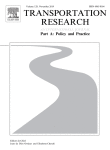New Publication on Transportation Patterns for Working-age Americans with Disabilities (NH UCEDD)
November 7, 2019

|
A recently published paper by Megan Henly and Debra Brucker at the Institute on Disability at the University of New Hampshire analyzed data on travel patterns to consider ways in which people with disabilities differ from people without disabilities in their daily transportation.
They found that people with disabilities take fewer trips, whether for work, errands, or socializing. In addition to being less likely to drive, people with a disability reported a wide range of travel impacts due to their disability. A majority say that they reduced their daily travel (71%) and 44% say they ask others for rides in order to travel. This likely limits the ability of those with a disability to spontaneously travel and to travel for reasons deemed non-essential (e.g., for recreation or socialization). These results demonstrate the ways in which travel continues to be a barrier to the full economic and social participation among working-age Americans with disabilities.
The full article can be found here through Nov 14: https://authors.elsevier.com/a/1Znqf3Rd3uniB3







